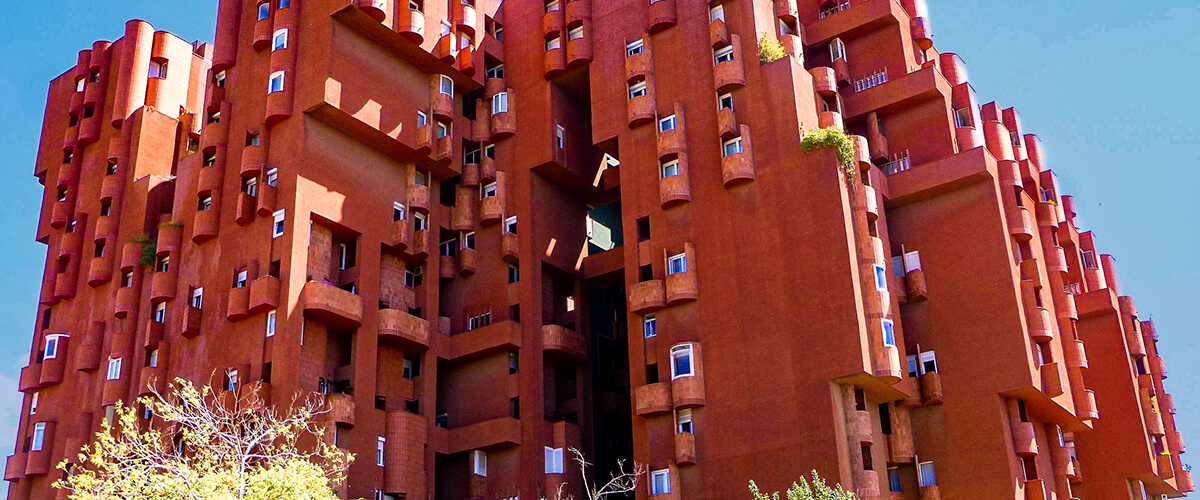Built into the suburbs of Barcelona, in a town called Sant Just Desvern, is an apartment block that looks like it came from a science fiction movie. Walden-7 is a true, hidden gem of 1970s utopian design by architect Ricardo Bofill. Construction started in 1972 and over 45 years later, the tower block still plays host to around 1,000 occupants.
Walden-7 is a utopian design that has stood the test of time...
31,140 m2 (37243.13 sq yd), 18 towers over 16 stories of apartments, and public conveniences. The name was inspired by B. F. Skinner’s science-fiction novel, Walden Two, 1948. Ricardo Bofill has also built his Architectural headquarters alongside it from a converted concrete factory.

Images: Courtesy of Ricardo Bofill Taller de Arquitectura
Walden 7
Walden-7 is 31,140 m2 (37243.13 sq yd), compromised of 18 towers over 16 stories. It was designed to be a self-contained "city within a city". Alongside the apartments, there are public spaces, meeting rooms, bars and shops on the ground floor, a small library, 7 interconnected interior courtyards, and even two swimming pools on the flat roof.
There are around 446 residences built from 30m2 (323 ft sq) modular, "cells". A studio is 1 cell, but the apartments range from 1-4 modules in size. Some are level and others run over two floors. Several of the apartments have been joined together which means, these days it's almost impossible to know the exact number of apartments.
The concept
The original design was for a much large complex. It featured two more tower blocks, and two lower buildings, all connected by groundfloor passages. However, this never came into fruition.
Walden-7 has never had a central owner. Its idealist and utopian ethos inspired the first wave of residents: many middle-class, idealist, poets, and artists. Parties were reportedly regularly held on the rooftop and decisions were made via assemblies. Decorations still hint at Walden-7's bohemian past, such as lines of poetry on walls of the underground carpark and a nudist's placard on one of the terraces.

The terracotta exterior color is in sharp contrast to the aqua-blue of the interior. Images: Courtesy of Ricardo Bofill Taller de Arquitectura
Walden-7 in the 21st Century
The 1960s and 1970s were no stranger to utopian architecture, from the geometric and open living designs of Renée Gailhoustet's Ivry-sur-Seine to the outrageous Arata Isozak's Cities in the Sky concept.
Incredibly, unlike many of its contemporaries, the concept behind Walden-7 appears to have stood the test of time. Both visitors and residents still sing its praises.

Images: Courtesy of Ricardo Bofill Taller de Arquitectura
Times may have changed, but assemblies are still held and a management team is voted democratically. During the summer months open-air theater is held in one of the 7 interior courtyards and 0.7% of the building's budget is donated to charity.
However, the design is not perfect. Walden-7 was originally covered in tiles. Unfortunately, these began to fall off and became quite a hazard. In 1995 they were mostly removed and the building was painted instead.
The name
Walden-7 was named after B. F. Skinner's science-fiction novel, Walden Two, 1948. The book depicts a utopian community where environmental factors are used to control behavior. You can certainly see where the idealism came from. In the book there were 6 Waldens and so, it was only logical, to name this project Walden-7.

Images: Courtesy of Ricardo Bofill Taller de Arquitectura
La Fabrica
If you look at aerial photographs of Walden-7, you'll see another iconic building, nestled into the landscape: La Fabrica -- 1975: the Headquarters of Ricardo Bofill Taller de Arquitectura. This building was converted from a 1917 cement factory: "La Auxiliar de la Construcción, SA".

Headquarters of Ricardo Bofill Taller de Arquitectura: La Fabrica. Image via Flickr 準建築人手札網站 Forgemind ArchiMedia
When Ricardo Bofill first discovered the factory it was abandoned and partly in ruins. There were full of cement, stairs to nowhere, and reinforced concrete structures that had no function.
Surrealism in paradoxical stairs that lead to nowhere; the absurdity of certain elements hanging over voids; huge but useless spaces of weird proportions, but magical because of their tension and disproportion. -- Ricardo Bofill Website
Of the 30 silos, many were full of solid, compacted concrete. Huge amounts of concrete needed to be chipped away and resculpted which took around 1 1/2 years to complete. By the end, just 8 silos remained. These were converted to workshops, modeling labs, archives, and a library. While an industrial space was transformed into "the cathedral": 10-meter high ceilinged venue, used for exhibitions, lectures, concerts, and cultural activities.

Headquarters of Ricardo Bofill Taller de Arquitectura: La Fabrica. Images: Courtesy of Ricardo Bofill Taller de Arquitectura
The cement was cleaned and plants were planted to grow back over the building. Eucalyptus, palms, olive trees and cypresses now cover the grounds and give the building a post-apocalyptic, rebirth.
Ricardo Bofill's office is a rather stunning, 4 meter high, minimalist room with pristine white, modernist walls. His family home is also located within the building.

Images: Courtesy of Ricardo Bofill Taller de Arquitectura

Images: Courtesy of Ricardo Bofill Taller de Arquitectura

Images: Courtesy of Ricardo Bofill Taller de Arquitectura

Images: Courtesy of Ricardo Bofill Taller de Arquitectura

Images: Courtesy of Ricardo Bofill Taller de Arquitectura

Images: Courtesy of Ricardo Bofill Taller de Arquitectura

Images: Courtesy of Ricardo Bofill Taller de Arquitectura

Images: Courtesy of Ricardo Bofill Taller de Arquitectura

Images: Courtesy of Ricardo Bofill Taller de Arquitectura

Images: Courtesy of Ricardo Bofill Taller de Arquitectura

Images: Courtesy of Ricardo Bofill Taller de Arquitectura

Images: Courtesy of Ricardo Bofill Taller de Arquitectura

Images: Courtesy of Ricardo Bofill Taller de Arquitectura

Images: Courtesy of Ricardo Bofill Taller de Arquitectura

Images: Courtesy of Ricardo Bofill Taller de Arquitectura

Images: Courtesy of Ricardo Bofill Taller de Arquitectura

Images: Courtesy of Ricardo Bofill Taller de Arquitectura


Images: Courtesy of Ricardo Bofill Taller de Arquitectura

Images: Courtesy of Ricardo Bofill Taller de Arquitectura

Images: Courtesy of Ricardo Bofill Taller de Arquitectura

Images: Courtesy of Ricardo Bofill Taller de Arquitectura

Images: Courtesy of Ricardo Bofill Taller de Arquitectura

Images: Courtesy of Ricardo Bofill Taller de Arquitectura

Images: Courtesy of Ricardo Bofill Taller de Arquitectura

Images: Courtesy of Ricardo Bofill Taller de Arquitectura

Images: Courtesy of Ricardo Bofill Taller de Arquitectura

Images: Courtesy of Ricardo Bofill Taller de Arquitectura

Images: Courtesy of Ricardo Bofill Taller de Arquitectura

Images: Courtesy of Ricardo Bofill Taller de Arquitectura

Images: Courtesy of Ricardo Bofill Taller de Arquitectura

Images: Courtesy of Ricardo Bofill Taller de Arquitectura

Images: Courtesy of Ricardo Bofill Taller de Arquitectura

Images: Courtesy of Ricardo Bofill Taller de Arquitectura

Images: Courtesy of Ricardo Bofill Taller de Arquitectura

Images: Courtesy of Ricardo Bofill Taller de Arquitectura
Want to create your own Utopian fantasy?
It's easy with BricsCAD Shape. Download free for life at www.bricsys.com. Then make the effortless move to BricsCAD BIM. Freedom of choice, plus perpetual (permanent) product licenses that work with all languages, in all places. You'll love what we've built for you with the BricsCAD® product family.
Disclaimer: These links are being provided as a convenience and for informational purposes only; they do not constitute an endorsement or an approval by Bricsys of any of the products, services or opinions of the corporation or organization or individual. Bricsys bears no responsibility for the accuracy, legality or content of the external site or for that of subsequent links. Contact the external site for answers to questions regarding its content.

